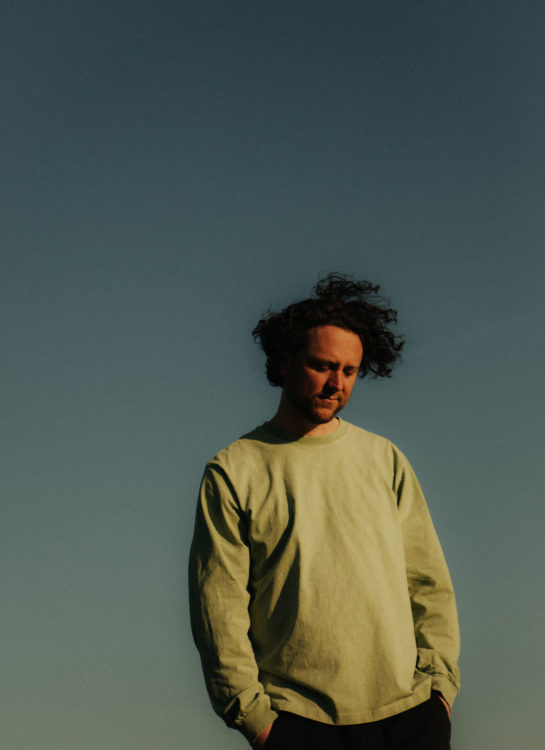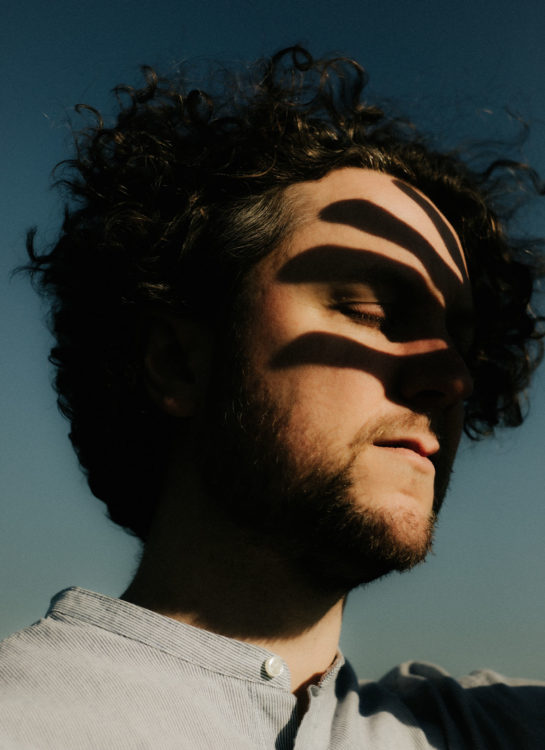- Words Isabelle Cassidy
- Photography Dan Medhurst
Ahead of a Kaleidoscope Festival appearance next month, George FitzGerald talks music bottling emotion, the human connection in collaborative working, and returning to the intimate elements of his sound.
George FitzGerald has been a staple of the electronic music scene for over a decade. Merging the underground spectrum with pop sensibilities, his tracks balance intricate melodies with house and garage rhythms, often alongside a familiar vocal guest. His latest EP, ‘Not As I’, dropped today, a masterclass that solidified a position at the forefront of British electronic music.
Starting out working in a London record shop in the mid-2000s and being part of the thriving club scene, George moved to Berlin in 2010. Signing to Paul Rose’s Hotflush Recordings, the first solo tracks of many were released as the artist began to pursue music full time. The decade that followed would see countless releases, from singles to EPs, albums to remixes, evolving from garage and R&B-influenced club tracks towards an analog-based techno/house sound. It would also later see a move back to the UK for the DJ and producer, returning to London after a decade in Berlin, and the birth of his daughter.
2022 bought ‘Stellar Drifting’, George FitzGerald’s third album, including collaborators London Grammar, Panda Bear and SOAK. Now experiencing the “afterglow” of the fizzing “nervous energy and maximalist sound design” in last year’s project, this is the space in which we’re presented with ‘Not As I’. It musically reminisces on the artist’s first record, ‘Fading Love’, returning to the reflective, calmer and more intimate parts of his sound.
If you want to catch a live show this summer, George’s set at Kaleidoscope Festival at Alexandra Palace would be a strong shout. Visitors will be treated to some specially created visuals, as he plays alongside fellow headliners Hot Chip, Fabio & Grooverider and more. Ahead of the gig, we caught up with the musician to discuss how his music bottles emotion, garnering the human connection in collaborative working, and the value of honouring dance music LPs.


Congratulations on your new single, “Mother”! How long have you been sitting on this one and why does now feel like the right time to get it out?
Thank you! The first idea for ‘Mother’ was a sketch I made in the studio about two to three years ago. I went through quite a difficult time in the studio after that. Not writer’s block but I couldn’t figure out where I wanted my music to go. You just have to work through those periods as a musician. Finishing the track happened very quickly at the end of last year, when it felt like the clouds had parted.
Seattle-born and raised SYML features on the song, who recently worked with Lana Del Rey. Did his songwriting help the track take on a new meaning, or were the intentions always clear?
When I write sketches or start tracks, I’m usually just trying to bottle a certain emotion. You can share those with other people and they become starting points in a conversation. I don’t like to be prescriptive with subject matter when it comes to songwriting. SYML had a very genuine and personal reaction to the music, and his songwriting just took it to another level completely.
Collaboration seems to be an important aspect of your music-making process. How do you choose who to work with? Are there any qualities that draw you to work with someone?
I’ve written music in loads of different settings but I find the human connection of working with somebody else on a piece of music to be the most exciting. It can also be disappointing or frustrating as you’re allowing somebody else into the process, but it’s worth the risk. I don’t have set rules for collaborators. It’s just somebody whose musical vision I find distinctive and exciting. Being in the studio with people who have totally different talents and perspectives allows you to get outside of yourself.
The track is taken from a forthcoming EP, which is due out later this year. You’ve said that you wanted to visit the more intimate parts of your sound which feature heavily on your debut album. Why is this so?
I wrote my last album, ‘Stellar Drifting’, largely in isolation, and it was full of all the anxious emotion and nervous energy of the past four years or so. That kind of maximalism is really enjoyable but also tiring. I’m in the afterglow of that time. You’re always in a conversation with yourself and your previous work, and returning to the more intimate, calm part of my sound feels exactly right for where I am at this moment.
Outside of music, is there anything else inspiring your sound at the moment?
My children, and their ever expanding horizons. My dilettante attempts at photography. The amazing musical and artistic community I’m surrounded by in south east London. There is inspiration everywhere, it’s a case of filtering it somehow.
Alongside the likes of Hot Chip and Wookie, you’re taking to Alexandra Palace in July for Kaleidoscope Festival. Is there anything George FitzGerald’s live sets that fans can be excited to witness?
The beautiful artwork that was created for ‘Stellar Drifting’ by the artist/graphic designer David Rudnick has been translated into moving image for the live show. It syncs and reacts with a lot of the instruments we’re playing on stage, so I’m very excited for people to see that.
Last month you took to the 1s and 2s at The Lot Radio in New York for a high-tempo, hour-long set. Is your selection process when DJing different to how you plan your live sets? Or is each process more similar than we may expect?
DJing was my first love, and it complements the experience of playing live. For me, the point of DJing is that you can play absolutely anything. If you’re not exercising that then you’re not doing it properly. Obviously with live sets you’re constrained (mostly) by your own back catalogue, so it’s more a process of reinterpretation and presentation. Playing live is magical because you’re fully in the moment. DJing is more considered.
What’s your current favourite track to play out in a set?
“Feels Like My Hands Are On Fire” by Salute.
You said in a previous interview that “There are far less successful LPs in dance music than in a lot of other genres”. Do you think this is still true?
I still think that dance music is unfairly categorised as a more single-based artform than other genres. The UK continues to produce some of the most interesting, inventive dance music in the world but how many LPs do we see being honoured or even nominated at things like the Mercury Awards? Almost none. That is reserved for ‘serious’ genres like indie and jazz.
To wrap up, beyond this new EP and forthcoming Kaleidoscope appearance, is there anything else you’re looking forward to about the summer? Any plans to wind down from such a busy schedule?
Touring always takes you away from the studio, and I feel tremendous energy to write more music. That’s not always the case, so you have to go with it when the feeling comes. I can’t wait.

